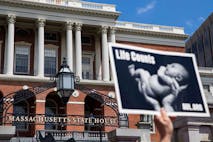
Chinese billionaire alleged to have 100+ children by American surrogates
Cassy Cooke
·
SCOTUS halts Texas pro-life law at the request of abortion industry
The highest court of the land has forced the state of Texas to allow the predatory abortion industry to begin functioning under shoddy standards once again. A crucial provision of HB2, the landmark pro-life bill which passed the Texas Legislature last summer, requires that abortion mills meet ambulatory surgical center (ASC) standards before committing abortions.
These standards ensure a basic level of safety for mothers, one that is guaranteed to all Texas women who have to undergo similar surgical procedures that do not involve abortion. But the Supreme Court of the United States has blocked these provisions while the case is being litigated.
“Texans have the freedom to prioritize women’s health and safety over the bottom line of abortionists, and this good law affirms that,” said Casey Mattox of Alliance Defending Freedom.
Since it passed, HB2 has endured endless attacks from the abortion industry– the coffers of which are the only thing negatively affected by the law. In the saga that led up to the current SCOTUS ruling, the ASC and admitting privileges rules were challenged by a cohort of abortion businesses and practitioners. A federal district judge issued an injunction against those provisions, allowing abortion mills to function as they did pre-HB2.
However, the Attorney General’s office appealed the ruling to the Fifth Circuit Court of Appeals in New Orleans, which issued a partial stay on that injunction. The partial stay came with an extensive ruling by the three-judge panel that granted it, and the ruling was contingent upon the decision of another Fifth Circuit panel’s review, which was to take place at a yet-to-be-announced date.
Article continues below
Dear Reader,
In 2026, Live Action is heading straight where the battle is fiercest: college campuses.
We have a bold initiative to establish 100 Live Action campus chapters within the next year, and your partnership will make it a success!
Your support today will help train and equip young leaders, bring Live Action’s educational content into academic environments, host on-campus events and debates, and empower students to challenge the pro-abortion status quo with truth and compassion.
Invest in pro-life grassroots outreach and cultural formation with your DOUBLED year-end gift!
In the meantime, the partial stay allowed the provisions in question to be enforced, which effectively shuttered at least 13 non-compliant abortion mills in Texas. At this point, the abortion industry appealed to the Supreme Court of the United States, which shortly thereafter issued the block. The SCOTUS decision, however, is also contingent upon the ultimate, aforementioned decision that is to come from the separate Fifth Circuit panel. ADF’s Casey Mattox continues:
The Supreme Court’s decision only temporarily and partially prevents the Texas law from going into effect while the 5th Circuit finishes hearing the case. While that is disappointing, it should cause no great alarm. The state’s requirement against cut-and-run abortionists remains in effect for all but two abortion facilities. The restriction on abortions after 20 weeks on unborn children who can feel pain was never challenged and remains in effect today. Likewise, the limitations on chemical abortions up to seven weeks gestation and prohibiting abortionists from sending women home alone to abort have been upheld and remain in effect. We remain confident that the entirety of Texas’s law will ultimately be upheld.
The Center for Reproductive Rights, which spearheaded this latest legal attack on HB2, said of the 13 abortion mills that initially closed when the ASC provision went into effect:
…if the stay entered by the 5th Circuit is not vacated, the clinics forced to remain closed during the appeals process will likely never reopen.
In addition to blocking the ASC rule, SCOTUS also granted exceptions to the admitting privileges rule for two abortion mills which could not secure such privileges at any local hospital. The abortion industry argues that the provisions pose an “undue burden” to women seeking abortion by eliminating many of the state’s abortion mills, and an undue financial burden to abortion mills that would have to invest money in re-working their facilities to meet the standards of a safe ASC facility.
Justices Antonin Scalia, Samuel Alito, and Clarence Thomas dissented to the decision, but the order was not signed by the other justices, who did not outline the reason for their disagreement with the Fifth Circuit’s partial stay.
Live Action News is pro-life news and commentary from a pro-life perspective.
Contact editor@liveaction.org for questions, corrections, or if you are seeking permission to reprint any Live Action News content.
Guest Articles: To submit a guest article to Live Action News, email editor@liveaction.org with an attached Word document of 800-1000 words. Please also attach any photos relevant to your submission if applicable. If your submission is accepted for publication, you will be notified within three weeks. Guest articles are not compensated (see our Open License Agreement). Thank you for your interest in Live Action News!

Cassy Cooke
·
Politics
Cassy Cooke
·
Politics
Bridget Sielicki
·
Analysis
Angeline Tan
·
Politics
Bridget Sielicki
·
Politics
Mark Wiltz
·
Human Interest
Lauren Enriquez
·
Activism
Lauren Enriquez
·
Activism
Lauren Enriquez
·
Activism
Lauren Enriquez
·
Lauren Enriquez
·